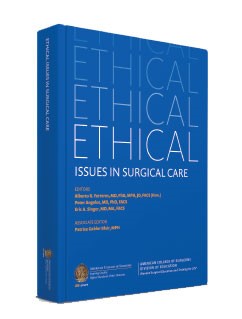One of the most exciting achievements in medicine over the past three decades has been our ability to give patients with cancer longer lives and better quality of life. Since 1991, the cancer death rate has steadily declined, resulting in 29% fewer deaths.1 Significant work across the medical community has gotten us to this point, including advances in treatments and prevention. Today, these successes are driving us to go further. Through a new American College of Surgeons (ACS) program, we will bring the latest surgical research discoveries to the frontlines of care, so more patients can benefit.
Called the Cancer Surgery Standards Program (CSSP), the new program will help surgeons consistently deliver the best surgical care using evidence-based standards. These specific operative techniques are proven to improve outcomes that are meaningful to patients, including survival and quality of life. Initially, we’ll focus on standards for breast, colon, lung and rectal cancers and melanoma.
Increasing evidence supports standardizing surgical care. For example, enhanced recovery programs that standardize the perioperative care experience have been shown in multiple studies to deliver better outcomes and a better patient experience. Breast or gastric cancer patients whose surgeons follow technical standards live longer lives than those whose surgeons don’t follow these standards.2,3 Following standards can help us better ensure we’ve done all we can for our patients, and the CSSP will help us do that.
The CSSP ties together a century of work by ACS and its partners across our six existing cancer programs. Since 1922, ACS has set standards that reduce care variably and help surgeons and hospitals understand how to improve based on the best possible evidence. As part of our ongoing work, we also created a common language for diagnosis and data collection, and we help hospitals track how they’re performing against the standards. Through third-party review and accreditation, we ensure hospitals are meeting the high bar we’ve set. And we conduct and support clinical research, so we can gain new understanding of how to extend lives and improve care.
The CSSP strengthens these efforts, by bridging the gap between research and care. It also ensures compliance with best practices through more detailed documentation. Using synoptic operative reports, a digital checklist, surgeons will document all important aspects of the operation, such as whether the resection was complete and any findings that may impact staging or future care. It’s critical that we know and document whether we removed a tumor completely or adequately removed lymph glands to understand the patient’s risk of a recurrence.
These reports go beyond the typical surgeon’s narrative to provide detailed information in a format that is consistent from surgeon to surgeon, and hospital to hospital. Evidence shows that up to half of vital information is missing from the narrative, and these synoptic reports are designed to capture all important cancer details.4 In the future, this information will be automatically entered into the hospital registries and the National Cancer Database, which will allow us to continue to conduct research and identify opportunities to strengthen standards.
Soon, cancer centers accredited by the ACS Commission on Cancer (CoC) will be required to follow these standards, and we will provide surgical and quality teams with easily accessible education materials so they can be seamlessly implemented in the operating room. Today, nearly 80% of patients with cancer receive their care at a center accredited by the CoC, and this effort will further strengthen what it means to be an accredited center.
When ACS began setting standards for cancer care a century ago, little was known about the disease. In fact, many people feared that it is contagious. We’ve come a long way in understanding cancer, how to control it for many patients, and how to cure it for an increasing number of others. There’s more work to be done, but this program is an important step forward to ensure every patient receives the best possible surgical care, based on the best available evidence.
Learn more about the Cancer Surgery Standards Program.
References
- Siegel, RL et al. Cancer statistics, 2020. CA: A Cancer Journal for Clinicians. 08 Jan. 2020. https://acsjournals.onlinelibrary.wiley.com/doi/full/10.3322/caac.21590.
- Zhao B, Tsai C, Hunt KK, et al. Adherence to surgical and oncologic standards improves survival in breast cancer patients. J Surg Oncol. 2019 Aug;120(2):148-159. DOI: 10.1002/jso.25506
- Zhao B, Blair SL, Katz MHG, et al. Adherence with operative standards in the treatment of gastric cancer in the United States. Gastric Cancer. 2020 May;23(3):550-560. DOI:10.1007/s10120-019-01028-5.
- Bidwell SS, Merrell SB, Poles G, Morris AM. Implementation of a synoptic operative report for rectal cancer: a mixed-methods study. Dis Colon Rectum. 2020 Feb;63(2): 190-199. DOI: 10.1097/DCR.0000000000001518.
About the Author
Heidi Nelson, MD, FACS, is director of the ACS Cancer Programs. She is Emeritus chair of the Department of Surgery and the Fred C. Andersen Professor of Surgery at the Mayo Clinic, Rochester, Minn.





